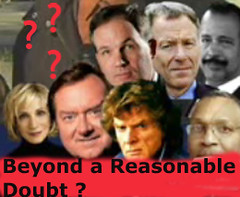I suspect Wells will argue reasonable doubt. He will tell the jury there is a reasonable doubt that Russert, Cooper, Miller, et. al. are accurate in their recall of conversations while Libby is not. He will tell them that even if they believe the Government witnesses are accurate, they must have a reasonable doubt that Libby intentionally lied or tried to mislead the grand jury, as opposed to being mistaken. All Wells needs for a not guilty verdict is for the jury to weigh the evidence and conclude one of these eight scenarios apply:
- Based upon the evidence presented, we the Jury find that the defendant is absolutely 100% innocent
- Based upon the evidence presented, we the Jury, cannot be absolutely sure that the defendant is innocent.
- Based upon the evidence presented, we the Jury are confident that the defendant is innocent
- Based upon the evidence presented, we the Jury believe that the defendant is probably innocent.
- Based upon the evidence presented, we the Jury are not really sure one way or the other if the defendant is guilty or innocent
- Based upon the evidence presented, we the Jury believe it is more likely that not that the defendant is guilty.
- Based upon the evidence presented, we the Jury believe that the defendant is probably guilty.
- We the Jury believe that the defendant is guilty but the evidence falls a little short and we cannot find that the defendant is guilty beyond a reasonable doubt.
Wells will go through each of the Government witnesses and show where and how their memories likely were inaccurate,inconsistent or not credible. For example, Ari Fleischer denied he was a source for Walter Pincus while Pincus testified Ari was one of his sources. Wells will not argue Ari Fleischer should have been charged with perjury. He will argue that both Fleischer and Pincus can't be correct and that if Fleischer's memory failed him on the Pincus conversation, maybe it also failed him on his conversation with Libby -- the one in which Libby told him about Joseph Wilson's wife working at the CIA and having a role in sending him to Niger and that it was "hush, hush" and "on the q.t."
While Libby isn't charged with lying about his conversation with Fleischer, it's another example of how faulty everyone's memory is in this case.
With Matthew Cooper, Wells will argue that Cooper misconstrued his
sloppily typed notes, which read:
"had somethine and abou the Wilson thing and not sure if it's ever."
Wells will ask the jury, given the examples they saw of Cooper typing the letter "r" for "n" in other notes, and using the word "and" as a pause between sentences, how can they be certain Cooper's note wasn't a reflection of Libby saying:
"heard something about the Wilson thing and not sure if it's even true"?
Cooper says his recollection now is that Libby said "Yeah I've heard that, too or words to that effect." But it's not in his notes. Which is more trustworthy, Wells will ask the jury, what he wrote then or what he remembers now, or neither, since his notes are fairly undecipherable? How can the jury conclude beyond a reasonable doubt that Cooper's current memory is correct while Libby's memory as contained in his grand jury testimony is wrong?
Wells will tell the jury to use its common sense, particularly when it comes to memory. They will be instructed that a reasonable doubt is one that is based on reason and common sense. The jury is allowed to take its common sense, gathered from their lifetimes of experience, into the jury room.
He will ask them to remember times they have been certain they said "x" when it later turned out they said "y." Were they lying? Or simply mistaken? How can they not have a doubt that Libby too, was mistaken rather than lying?
I am not arguing here for Libby's acquittal. I'm not predicting an acquittal. (Personally, I think Wells has a Russert problem, and unless he argues that Libby mixed him up with another reporter, perhaps Novak, whom he spoke with on the 9th, just a day or two earlier than Russert, I'm not sure how he gets around it.) I'm merely pointing out what I think Wells' best arguments are and that he isn't going to go for a jury nullification argument, no matter how much Toensing wishes he would.
In fact, I can't think of a worse argument to make to the jury.
[cross-posted at Firedoglake and Huffington Post.]




